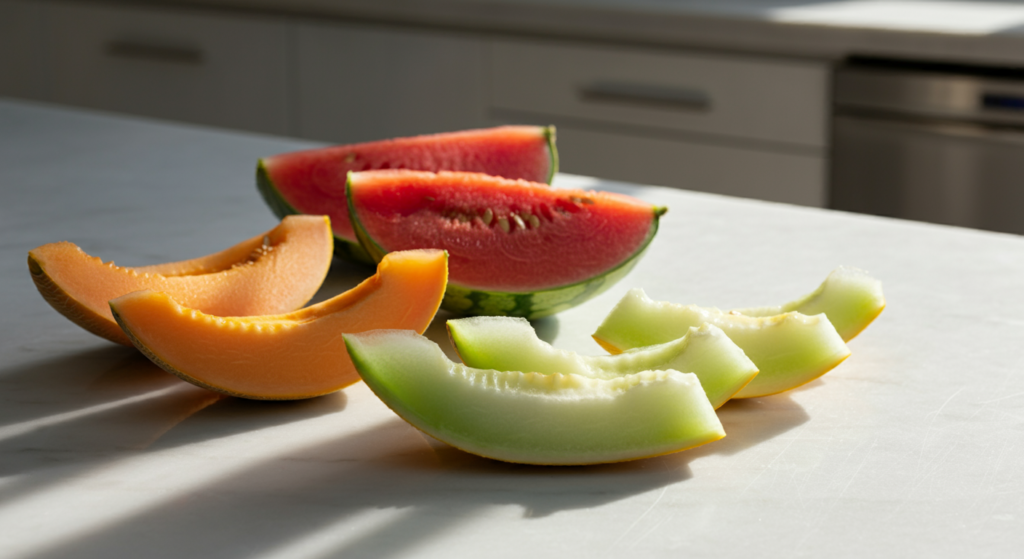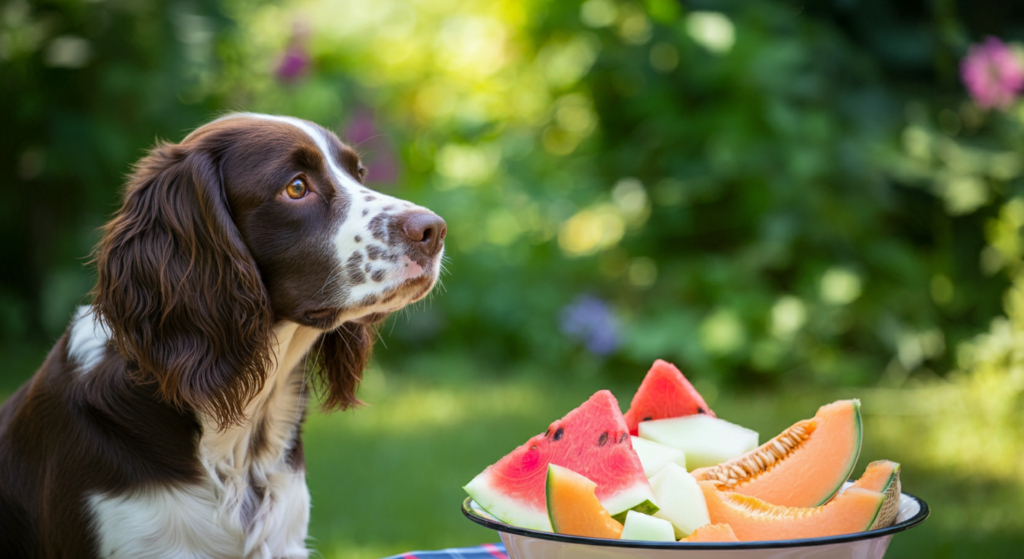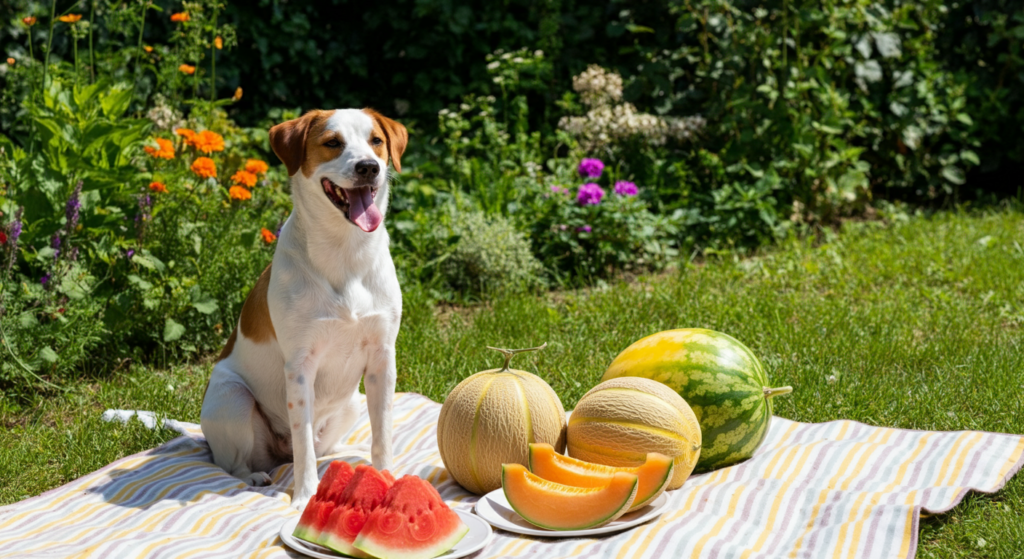Can dogs eat Melon?
Can dogs eat melon?: Safe Snack or Hidden Danger?
As dog owners, ensuring the safety of our furry friends’ diet is always a top priority. With so many human foods potentially posing risks to dogs, it’s only natural to question whether certain items are safe to share. Melons, a refreshing and nutrient-rich fruit enjoyed globally, often prompt the question: “Can dogs eat melon?” While melons are a healthy treat for humans, it’s important to explore whether they’re suitable for our canine companions. Knowing the facts can help you make informed decisions when considering sharing this sweet snack with your pet.
Yes, dogs can eat melon, but only under specific conditions. When served plain, seedless, and in moderation, melon is safe for dogs and may even provide some health benefits. However, not all parts of a melon are dog-friendly. Factors like seeds, rind, and sugar content are important to consider when deciding whether to offer this treat to your pet. Let’s dive deeper to ensure you’re making the best choice for your dog’s health.
Table of Contents
What Is Melon?
Melons are sweet, juicy fruits that belong to the gourd family. They come in many varieties, such as watermelon, cantaloupe, and honeydew. Each type has its own unique flavour and nutritional profile, but they all share common characteristics: high water content, natural sweetness, and a refreshing taste.
In human cuisine, melons are often served fresh, in fruit salads, or as juice. While melons are healthy for humans, it’s essential to understand how their components might affect dogs before sharing this treat with your furry friend.
Can Dogs Eat Melon?
The simple answer is yes, dogs can eat melon, but only in moderation and under certain conditions. When served plain and without seeds or rind, melon can provide health benefits. Its high water content makes it a hydrating snack, while natural vitamins and minerals support overall health.
However, not all melons are created equal. Can dogs eat watermelon? Yes, but the seeds and rind should be removed. The same applies to cantaloupe and honeydew, which are safe for dogs as long as they’re prepared properly.
What Are the Benefits of Melon for Dogs?
Melon, when prepared correctly and offered in moderation, can provide certain benefits to your dog. While not essential to a dog’s diet, this fruit contains nutrients and compounds that may support your pet’s overall health. Here are some potential benefits of melon for dogs:
1. Hydration
Melons have a high water content, making them an excellent snack for keeping your dog hydrated, especially during hot weather. This can help regulate body temperature and support overall health.
2. Rich in Vitamins
Melons contain essential vitamins, such as:
- Vitamin A: Supports vision, immune function, and skin health.
- Vitamin C: Acts as an antioxidant, helping to fight free radicals and support the immune system.
- Vitamin B6: Plays a role in brain health and energy metabolism.
3. Low in Calories
Compared to many other treats, melon is relatively low in calories, making it a good option for dogs that need to maintain a healthy weight.
4. Provides Dietary Fibre
Melons contain a small amount of dietary fibre, which can support healthy digestion and regular bowel movements in dogs.
5. Antioxidant Properties
Melons are rich in antioxidants that help reduce oxidative stress, supporting a healthy immune system and promoting overall well-being.

Are Melons Bad for Dogs?
In moderation, melons are not bad for dogs. However, excessive consumption or improper preparation can lead to digestive upset or other health concerns. Here are some factors to consider:
1. High Sugar Content
Melons are naturally high in sugar, which can pose a problem for dogs with diabetes or those prone to weight gain. Too much sugar can also lead to gastrointestinal upset.
2. Seeds
Melon seeds, while not toxic, can cause digestive blockages, especially in small dogs. Always remove the seeds before offering melon to your pet.
3. Rind
The rind of a melon is tough and difficult for dogs to digest. Consuming it may lead to:
- Choking Hazard: Particularly for smaller dogs.
- Digestive Obstruction: The rind can cause blockages in the digestive tract.
4. Overeating
Even healthy treats like melon should be given in moderation. Overeating can lead to:
- Diarrhoea
- Vomiting
- Bloating or gas
What Are the Dangers of Dogs Eating Melon?
While melon can offer some benefits, there are potential risks every pet owner should understand before sharing this treat with their furry friend:
1. Choking Hazard
Seeds and rind can pose choking risks. Always remove these parts before feeding melon to your dog.
2. Digestive Upset
Large quantities of melon can overwhelm a dog’s digestive system, leading to vomiting, diarrhoea, or stomach pain.
3. Allergic Reactions
Though rare, some dogs may be allergic to melon. Signs of an allergic reaction include:
- Itching or scratching
- Swelling of the face or paws
- Difficulty breathing
4. Caloric Intake
While melon is low in calories, excessive consumption can still contribute to weight gain over time. Always consider melon as an occasional treat rather than a dietary staple.

How Many Melons Can Dogs Eat?
Portion control is key when feeding melon to dogs. A small dog may only tolerate a few small pieces, while larger breeds might enjoy a few more. Introduce melon gradually to observe any adverse reactions, such as digestive upset or allergic responses.
If your dog shows signs of discomfort after eating melon, consult your veterinarian immediately. They can provide guidance on whether melon is a suitable treat for your specific dog.
Fun Facts About Dogs and Melons
- Dogs often love the sweet, juicy taste of melon, making it a popular summer treat.
- Melons have been cultivated for thousands of years and were even enjoyed in ancient Egypt.
- Some dogs may prefer one type of melon over another, so experiment with varieties like watermelon, cantaloupe, and honeydew to find your pup’s favourite.
Conclusion
So, can dogs eat melon? The answer is yes—with precautions. Always serve plain, seedless, and rind-free melon in moderation. Avoid overfeeding and consult your vet if you’re unsure about introducing melon into your dog’s diet. Remember, your dog’s health and safety come first. Have you tried giving your dog melon? Share your experience below!

FAQ: Can Dogs Eat Melon?
1. Can dogs eat melon?
Yes, dogs can eat melon in moderation. Melons like cantaloupe and honeydew are safe and can provide a hydrating, low-calorie treat. However, they should be given without the rind or seeds.
2. Can dogs eat honeydew?
Yes, honeydew is safe for dogs in small amounts. It is hydrating and contains vitamins, but the rind and seeds must be removed as they can cause choking or digestive issues.
3. Can dogs eat melon skin?
No, dogs should not eat melon skin. The rind is tough, difficult to digest, and can pose a choking hazard or cause intestinal blockages.
4. Can dogs eat honeydew melon skin?
No, honeydew melon skin should not be given to dogs for the same reasons as other melon rinds. It is tough and indigestible.
5. Can dogs eat melon seeds?
It is best to avoid feeding dogs melon seeds. While they are not highly toxic, they can be a choking hazard or cause digestive discomfort if consumed in large amounts.
6. Are any melons toxic to dogs?
No common melons are toxic to dogs. However, you should avoid adding sugar or other additives to melons, as these can harm your pet.
7. What melon is best for dogs?
Cantaloupe and honeydew are great choices as they are sweet, hydrating, and packed with vitamins like A and C. Watermelon is also an excellent option (seedless and rind-free).
8. Can dogs eat melon juice?
Pure melon juice without added sugars or artificial ingredients is safe for dogs in small amounts. However, it’s better to offer the fruit itself for fibre content.
9. Can dogs eat yellow melon?
Yes, yellow melon (like canary melon) is safe for dogs in small portions. Always remove the seeds and rind before serving.
10. Can dogs eat melon every day?
No, melon should not be given to dogs every day. While it is a healthy treat, too much can cause digestive upset due to its high sugar content. Offer it occasionally as a snack.
11. What precautions should I take when feeding melon to my dog?
- Always remove the rind and seeds.
- Serve in bite-sized pieces to prevent choking.
- Introduce melon gradually to monitor for any allergic reactions or digestive issues.
- Avoid feeding too much as it is naturally high in sugar.
Feel free to ask more questions or adjust this FAQ to suit your needs!
